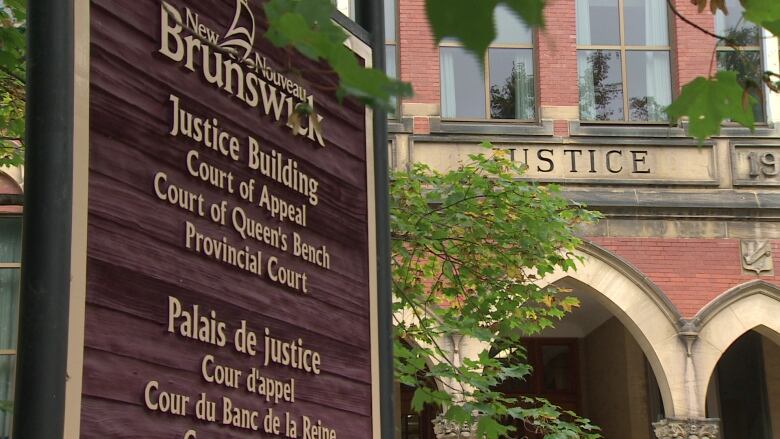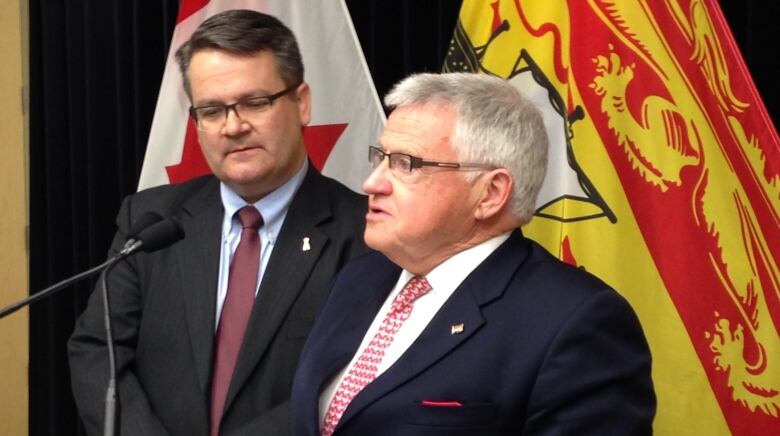Province should resolve grey area in aboriginal hunting rights, 2 judges say
4 New Brunswick cabinet ministers refused to comment on the Court of Queen's Bench justices' comments

Two Court of Queen's Bench judges have called on the province to do more to resolve legal ambiguities about how aboriginal and treaty rights apply to hunting.
The judges, in two January rulings on separate cases, say the courts aren't capable of handling the complex constitutional issues at play.
Justice Hugh McLellan called for "a more effective, timely and fair method" to resolve cases in his Jan. 22 decision on the conviction of a Mi'kmaq man with roots in Nova Scotia for hunting in the Saint John area.
And in a Jan. 27 ruling, Justice Terrence Morrison complained about the "frailties and inadequacies" of litigating treaty rights through the summary conviction of a member of the Woodstock First Nation who traded a moose carcass for a Dodge Durango.
A provincial government spokesperson said none of the ministers who deal with aboriginal hunting issues raised would comment.
"This issue is before the courts and therefore it would not be appropriate to provide further comment at this time," said Veronique Lacasse, who wrote that she was speaking for the Department of Natural Resources, the Aboriginal Affairs Secretariat, the Department of Public Safetyand the Office of the AttorneyGeneral.

He told a legislative committee that all recommendations sent to the Liberal cabinet "are looked at through the lens of aboriginal treaty rights and the duty to consult."
"Our target, in fact, is to have First Nations involved in all decision-making," he added.
"That's the ultimate goal."
Legal grey areas
But the two rulings suggest there are still substantial legal grey areas in how the province sees those rights when it prosecutes indigenous people for hunting violations.
In one case, McLellan struck down the jail time and fine imposed on Stephen Bernard, originally from the Shubenacadie First Nation in Nova Scotia. Bernard was convicted of hunting without a licence in Saint John in 2004.
McLellan pointed out Bernard's case has dragged on for years, with the Crown stopping and then re-starting the prosecution while other aboriginalrights case were before the courts.
The specific case against Bernard hinged on whether he was outside the traditional hunting grounds of his community.
McLellan ruled Bernard was too far from Shubenacadie territory to be exempt from New Brunswick's requirement for a provincial hunting licence.
But he agreed with the provincial court trial judge that the case "illustrates the need to find a more effective, timely and fair method to resolve questions between aboriginals and the state over aboriginal rights."
"Such questions lend themselves to civil resolutions, perhaps in the mode of a civil or administrative order or finding so that the parties can determine their respect rights."
McLellan upheld Bernard's conviction, but quashed the sentence of seven days in jail and a $2,000 fine.
Case revolves on sale of moose carcass
In the other case, Justice Morrison upheld a provincial court judge's decision to stop the prosecution for illegal possession and sale of a moose carcass against Michael Reynolds, a Maliseet member of the Woodstock First Nation.
The Crown acknowledged Reynolds' treaty right to hunt and sell the moose as a result of the 1999 Marshall ruling by the Supreme Court of Canada, which said Mi'kmaq and Maliseet people could earn a "moderate livelihood" through fishing under treaties their ancestors signed in 1760 and 1761.
Even so, prosecutors charged Reynolds for being a party to the violation by the non-aboriginal man, Addison Knox, who traded his Dodge Durango for the moose.
The province set up a permit system after the Marshall decision to allow non-aboriginal people to buy moose from aboriginal hunters.
But the Department of Natural Resources abolished the system in 2003 after consulting First Nations chiefs. That meant Knox's trade for the moose was illegal, the Crown argued during Reynolds' trial.
Reynolds' lawyer said the First Nations chiefs' 2003 agreement with the province to abolish permits for non-aboriginal people didn't comply with the Indian Act because there was no evidence it was approved by the Woodstock band council or membership.
That took the case into complex areas beyond the ability of a provincial court to handle, Morrison wrote, noting the trial judge didn't even deal with them.
This case raises complex issues which have far reaching implications for aboriginal treaty rights.- Justice Terrence Morrison in ruling
Morrison said the Supreme Court has made it clear "that it is not appropriate to determine aboriginal treaty rights in the context of a summary conviction prosecution."
"This case raises complex issues which have far reaching implications for aboriginal treaty rights," Morrison wrote, which require that "all parties interested in the outcome be given the chance to be heard."
He says, "the frailties and inadequacies of the summary conviction process for adjudicating aboriginal treaty rights" identified in earlier cases applied.
The government's written statement didn't say if the province will appeal the rulings.
Bernard's lawyer did not respond to a request for comment. Reynolds' lawyer, Maria Henheffer, said she couldn't comment without her client's permission












_(720p).jpg)


 OFFICIAL HD MUSIC VIDEO.jpg)
.jpg)



























































































